Get free scan and check if your device is infected.
Remove it nowTo use full-featured product, you have to purchase a license for Combo Cleaner. Seven days free trial available. Combo Cleaner is owned and operated by RCS LT, the parent company of PCRisk.com.
What is tags.bluekai.com?
BlueKai is a legitimate information tracking service owned by Oracle Corporation. Recently, however, many Mac OS users have encountered pop-ups/redirects leading to tags.bluekai.com (or stags.bluekai.com) that may seem malicious. There are two possible reasons for this: the operating system version is 10.9 or you have a potentially unwanted adware-type program (PUP) installed.
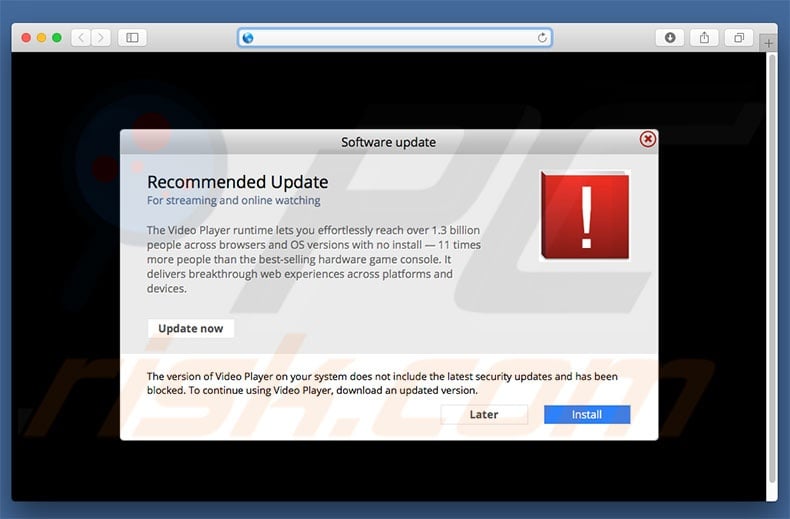
Research shows that Mac OS X 10.9 has a bug relating to the Safari web browser. The browser essentially struggles to verify certain website certificates (including bluekai.com and oracle.com), thereby causing this problem. In this case, there is just two solutions: 1) upgrade/downgrade the system [use another version], or; 2) switch to another web browser [stop using Safari].
If, however, your system is infected with adware, things can get more complicated. Firstly, adware-type applications are likely to deliver coupon, banner, pop-up, and other similar advertisements. To achieve this, developers employ tools that enable placement of third party graphical content on any visited website.
Therefore, intrusive advertisements often conceal underlying content, thereby significantly diminishing the browsing experience. Furthermore, some intrusive ads redirect to malicious websites. Even a single click can result in high-risk computer infections. Another important issue is data tracking.
Most adware gathers IP addresses, URLs visited, pages viewed, search queries, keystrokes, and/or other similar data that includes personal details. This information is shared with third parties (potentially, cyber criminals) who misuse it to generate revenue. Therefore, the presence of data-tracking apps can lead to serious privacy issues or even identity theft.
For these reasons, you should uninstall all PUPs immediately. In summary, BlueKai is a legitimate service. Redirects to tags.bluekai.com/stags.bluekai.com indicate that you are either running Mac OS X 10.9 version or your system is infected with adware.
Users who run other OS versions and encounter these redirects should immediately remove all dubious applications/browser plug-ins and scan the system with a legitimate anti-virus/anti-spyware suite, such as Combo Cleaner.
| Name | tags.bluekai.com pop-up |
| Threat Type | Mac malware, Mac virus |
| Symptoms | Your Mac became slower than normal, you see unwanted pop-up ads, you get redirected to shady websites. |
| Distribution methods | Deceptive pop-up ads, free software installers (bundling), fake flash player installers, torrent file downloads. |
| Damage | Internet browsing tracking (potential privacy issues), displaying of unwanted ads, redirects to shady websites, loss of private information. |
| Malware Removal (Windows) |
To eliminate possible malware infections, scan your computer with legitimate antivirus software. Our security researchers recommend using Combo Cleaner. Download Combo CleanerTo use full-featured product, you have to purchase a license for Combo Cleaner. 7 days free trial available. Combo Cleaner is owned and operated by RCS LT, the parent company of PCRisk.com. |
There are hundreds of adware-type applications, all of which are virtually identical. By offering a wide range of "useful features" (e.g., file conversion, system optimization, Flash games, e-shopping, etc.), PUPs attempt to give the impression of legitimacy. In fact, these applications are designed only to generate revenue for the developers.
Rather than enabling functions promised, adware-type PUPs generate intrusive advertisements and collect sensitive information, thereby posing a direct threat to your privacy and Internet browsing safety.
How did tags.bluekai.com install on my computer?
Some PUPs have official download websites, however, due to the lack of knowledge and careless behavior of many users, these programs typically infiltrate systems without consent. Developers proliferate adware using intrusive advertising and "bundling" methods. "Bundling" is essentially stealth installation of third party applications with regular software/apps.
Developers hide "bundled" applications within "Custom/Advanced" settings or other sections of the download/installation processes.
Many users rush these procedures and skip steps. In addition, they often click various advertisements without understanding the possible consequences. This behavior can lead to inadvertent installation of various PUPs - users expose their systems to risk of various infections and compromise their privacy.
How to avoid installation of potentially unwanted applications?
The key to computer safety is caution. Therefore, pay close attention when downloading/installing software and browsing the Internet in general. Select the "Custom/Advanced" settings and carefully analyze each window of the download/installation dialogs. Opt-out of all additionally-included programs and decline offers to download/install them.
In addition, download your programs from official sources only, using direct download links. Be aware that third party downloaders/installers are monetized using the "bundling" method (promoting PUPs). Therefore, these tools should never be used.
In addition, intrusive advertisements typically seem legitimate - developers invest many resources into their design - but most redirect to dubious websites (gambling, adult dating, pornography, and similar). If you encounter these ads, check the list of installed apps/browser extensions and eliminate any suspicious entries.
Instant automatic malware removal:
Manual threat removal might be a lengthy and complicated process that requires advanced IT skills. Combo Cleaner is a professional automatic malware removal tool that is recommended to get rid of malware. Download it by clicking the button below:
DOWNLOAD Combo CleanerBy downloading any software listed on this website you agree to our Privacy Policy and Terms of Use. To use full-featured product, you have to purchase a license for Combo Cleaner. 7 days free trial available. Combo Cleaner is owned and operated by RCS LT, the parent company of PCRisk.com.
Quick menu:
- What is tags.bluekai.com?
- STEP 1. Remove adware-relating files and folders from OSX.
- STEP 2. Remove rogue extensions from Safari.
- STEP 3. Remove adware from Google Chrome.
- STEP 4. Remove deceptive plug-ins from Mozilla Firefox.
Video showing how to remove adware and browser hijackers from a Mac computer:
Adware removal:
Remove tags.bluekai.com-related potentially unwanted applications from your "Applications" folder:
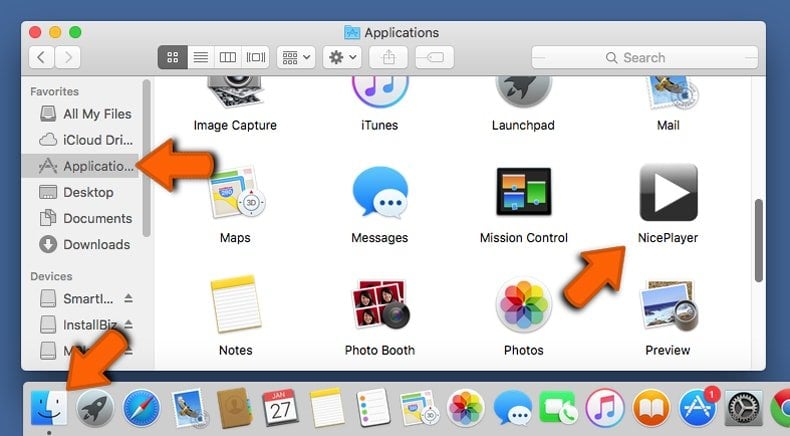
Click the Finder icon. In the Finder window, select “Applications”. In the applications folder, look for “MPlayerX”,“NicePlayer”, or other suspicious applications and drag them to the Trash. After removing the potentially unwanted application(s) that cause online ads, scan your Mac for any remaining unwanted components.
DOWNLOAD remover for malware infections
Combo Cleaner checks if your computer is infected with malware. To use full-featured product, you have to purchase a license for Combo Cleaner. 7 days free trial available. Combo Cleaner is owned and operated by RCS LT, the parent company of PCRisk.com.
Remove adware-related files and folders
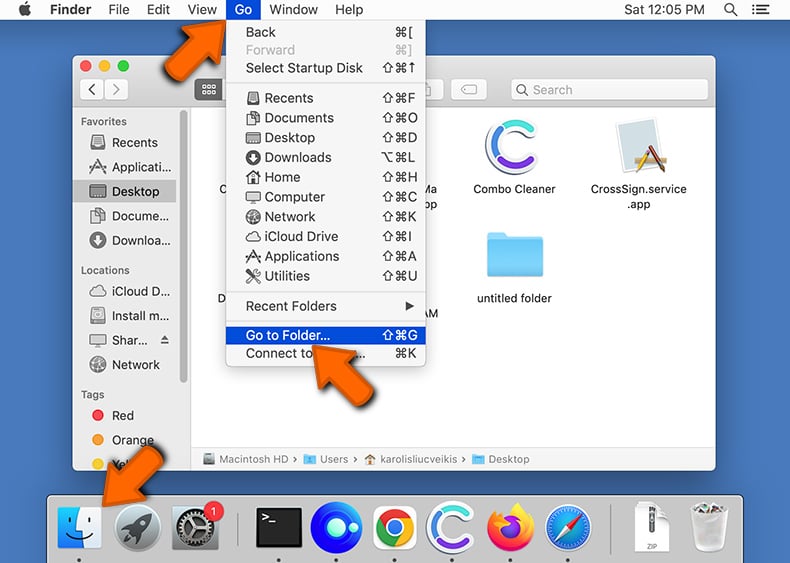
Click the Finder icon, from the menu bar. Choose Go, and click Go to Folder...
 Check for adware generated files in the /Library/LaunchAgents/ folder:
Check for adware generated files in the /Library/LaunchAgents/ folder:
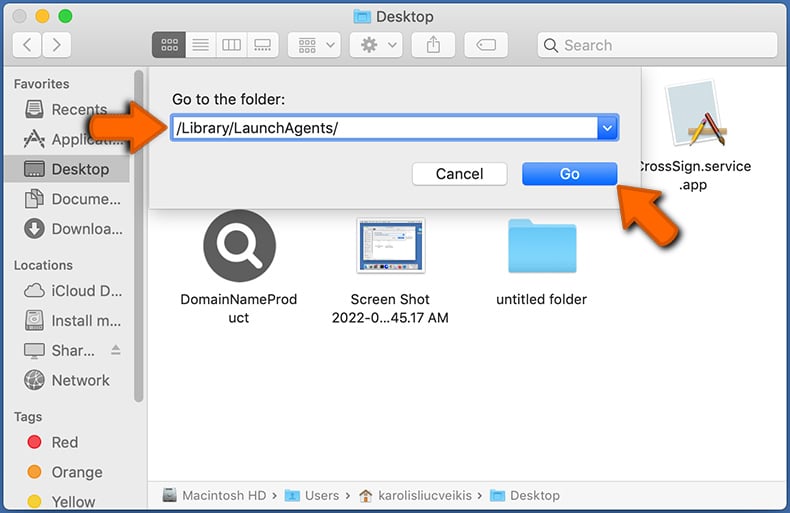
In the Go to Folder... bar, type: /Library/LaunchAgents/
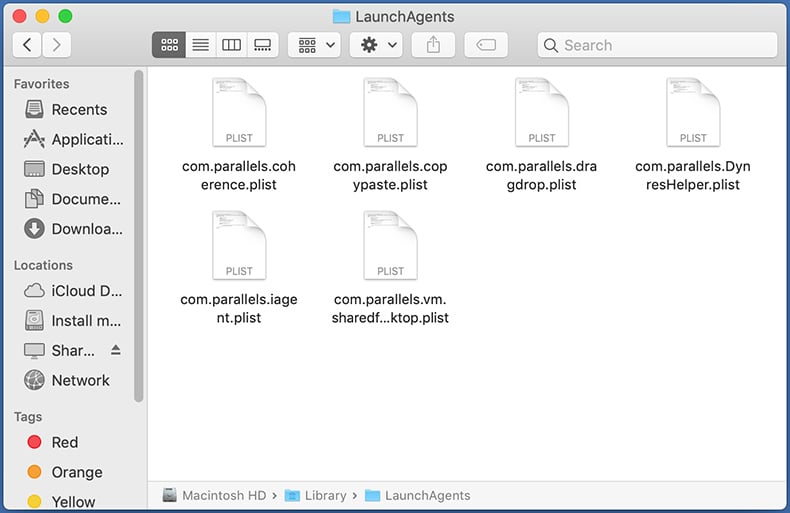
In the "LaunchAgents" folder, look for any recently-added suspicious files and move them to the Trash. Examples of files generated by adware - "installmac.AppRemoval.plist", "myppes.download.plist", "mykotlerino.ltvbit.plist", "kuklorest.update.plist", etc. Adware commonly installs several files with the exact same string.
 Check for adware generated files in the ~/Library/Application Support/ folder:
Check for adware generated files in the ~/Library/Application Support/ folder:
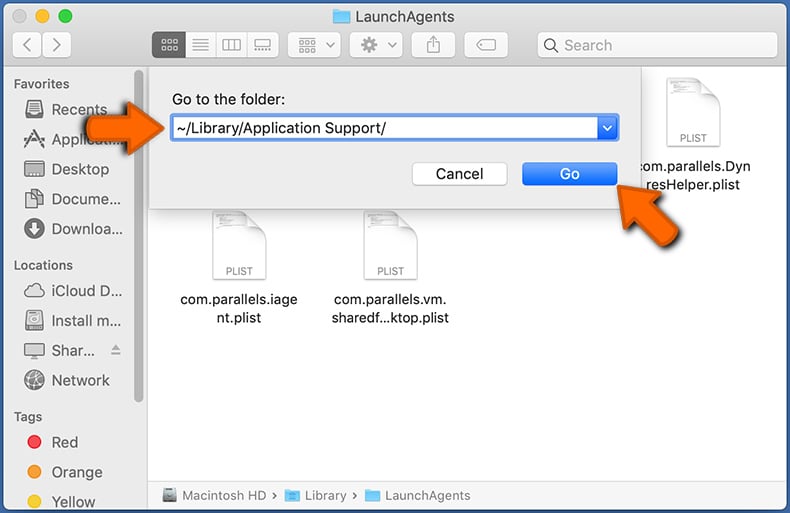
In the Go to Folder... bar, type: ~/Library/Application Support/
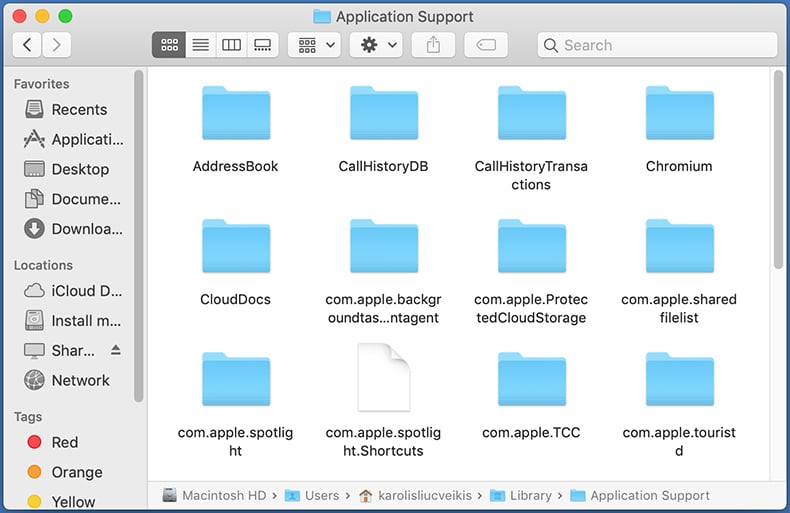
In the "Application Support" folder, look for any recently-added suspicious folders. For example, "MplayerX" or "NicePlayer", and move these folders to the Trash.
 Check for adware generated files in the ~/Library/LaunchAgents/ folder:
Check for adware generated files in the ~/Library/LaunchAgents/ folder:
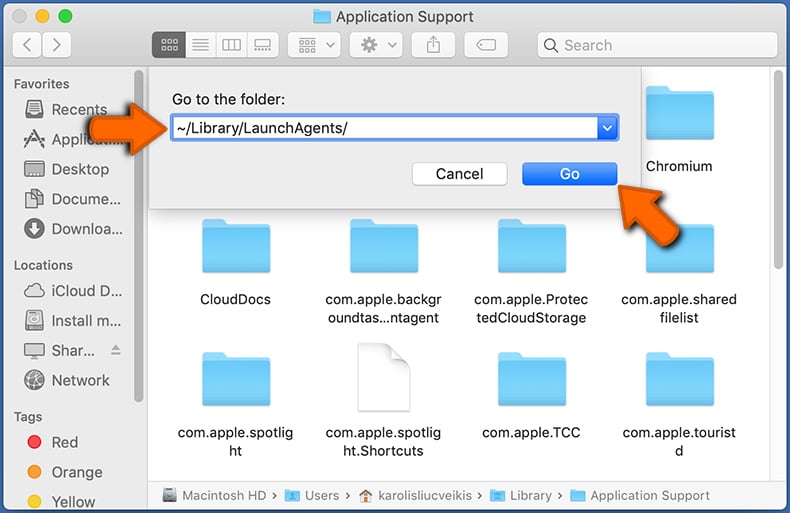
In the Go to Folder... bar, type: ~/Library/LaunchAgents/
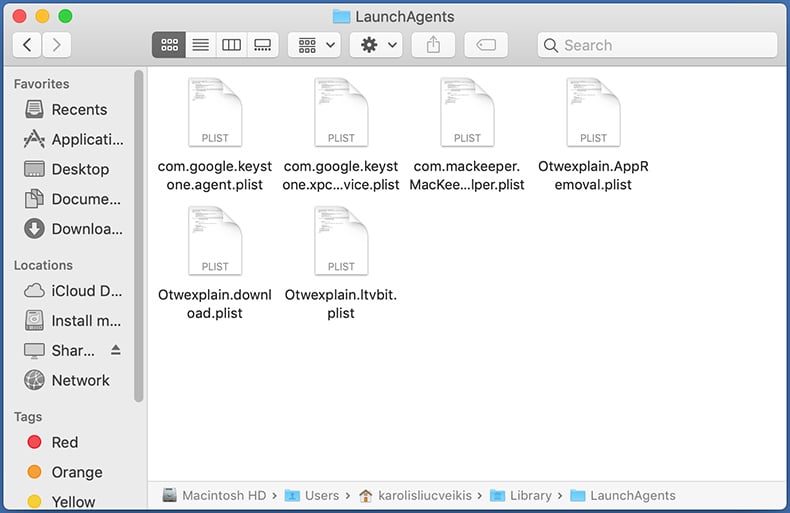
In the "LaunchAgents" folder, look for any recently-added suspicious files and move them to the Trash. Examples of files generated by adware - "installmac.AppRemoval.plist", "myppes.download.plist", "mykotlerino.ltvbit.plist", "kuklorest.update.plist", etc. Adware commonly installs several files with the exact same string.
 Check for adware generated files in the /Library/LaunchDaemons/ folder:
Check for adware generated files in the /Library/LaunchDaemons/ folder:
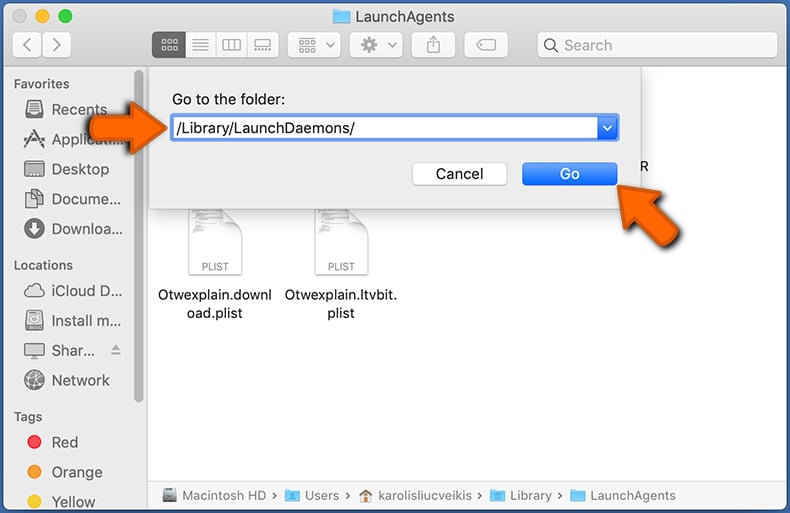
In the "Go to Folder..." bar, type: /Library/LaunchDaemons/
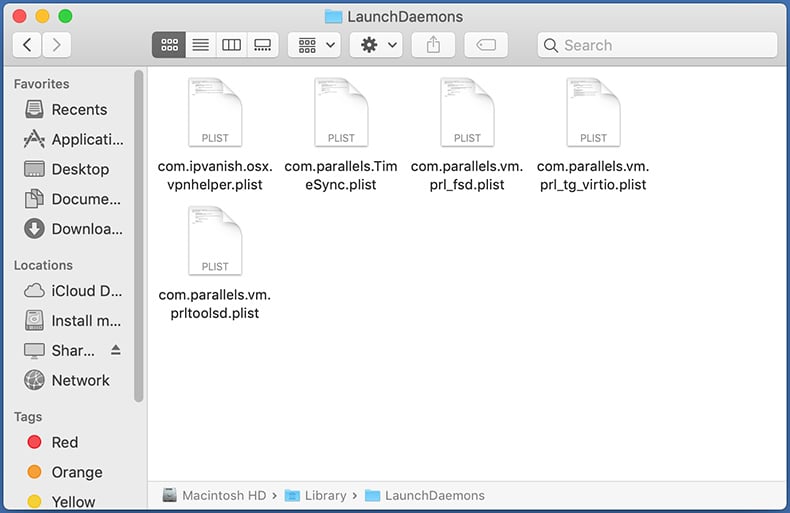
In the "LaunchDaemons" folder, look for recently-added suspicious files. For example "com.aoudad.net-preferences.plist", "com.myppes.net-preferences.plist", "com.kuklorest.net-preferences.plist", "com.avickUpd.plist", etc., and move them to the Trash.
 Scan your Mac with Combo Cleaner:
Scan your Mac with Combo Cleaner:
If you have followed all the steps correctly, your Mac should be clean of infections. To ensure your system is not infected, run a scan with Combo Cleaner Antivirus. Download it HERE. After downloading the file, double click combocleaner.dmg installer. In the opened window, drag and drop the Combo Cleaner icon on top of the Applications icon. Now open your launchpad and click on the Combo Cleaner icon. Wait until Combo Cleaner updates its virus definition database and click the "Start Combo Scan" button.
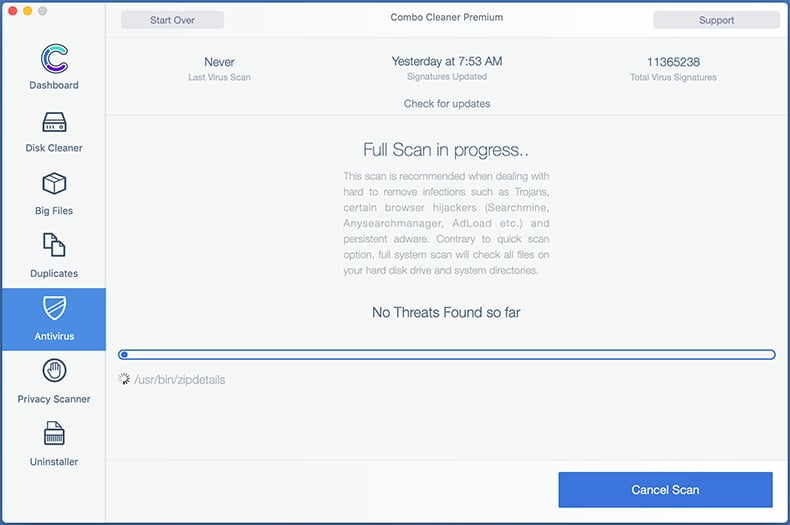
Combo Cleaner will scan your Mac for malware infections. If the antivirus scan displays "no threats found" - this means that you can continue with the removal guide; otherwise, it's recommended to remove any found infections before continuing.
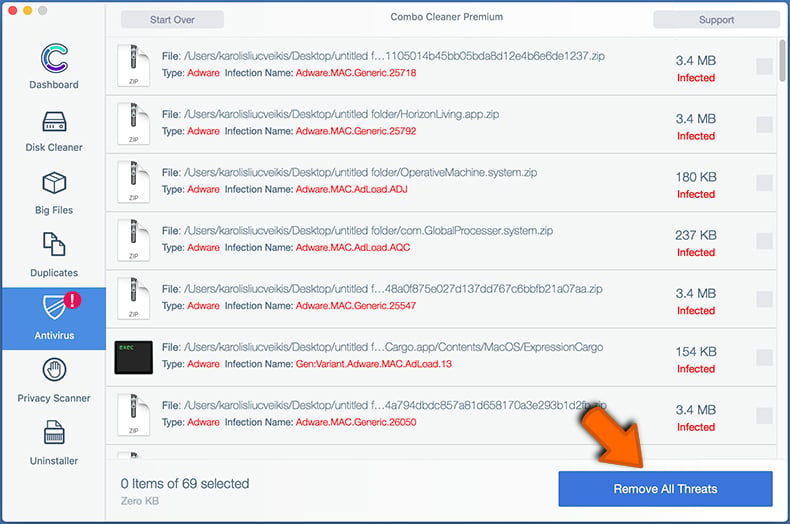
After removing files and folders generated by the adware, continue to remove rogue extensions from your Internet browsers.
Remove malicious extensions from Internet browsers
 Remove malicious Safari extensions:
Remove malicious Safari extensions:
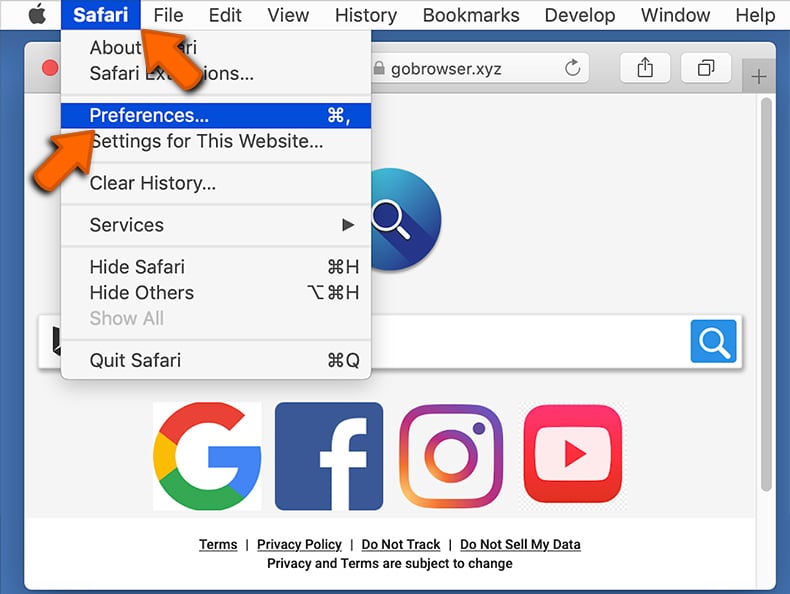
Open the Safari browser, from the menu bar, select "Safari" and click "Preferences...".
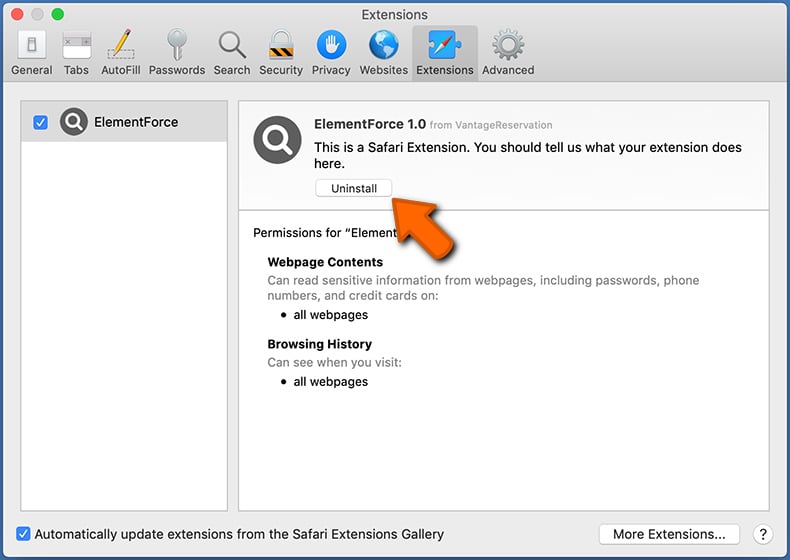
In the preferences window, select "Extensions" and look for any recently-installed suspicious extensions. When located, click the "Uninstall" button next to it/them. Note that you can safely uninstall all extensions from your Safari browser - none are crucial for regular browser operation.
- If you continue to have problems with browser redirects and unwanted advertisements - Reset Safari.
 Remove malicious extensions from Google Chrome:
Remove malicious extensions from Google Chrome:
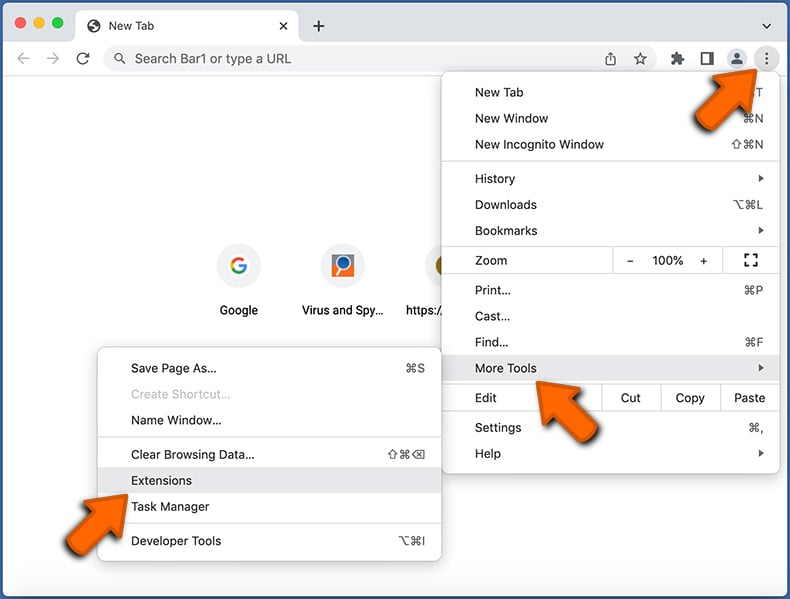
Click the Chrome menu icon ![]() (at the top right corner of Google Chrome), select "More Tools" and click "Extensions". Locate all recently-installed suspicious extensions, select these entries and click "Remove".
(at the top right corner of Google Chrome), select "More Tools" and click "Extensions". Locate all recently-installed suspicious extensions, select these entries and click "Remove".
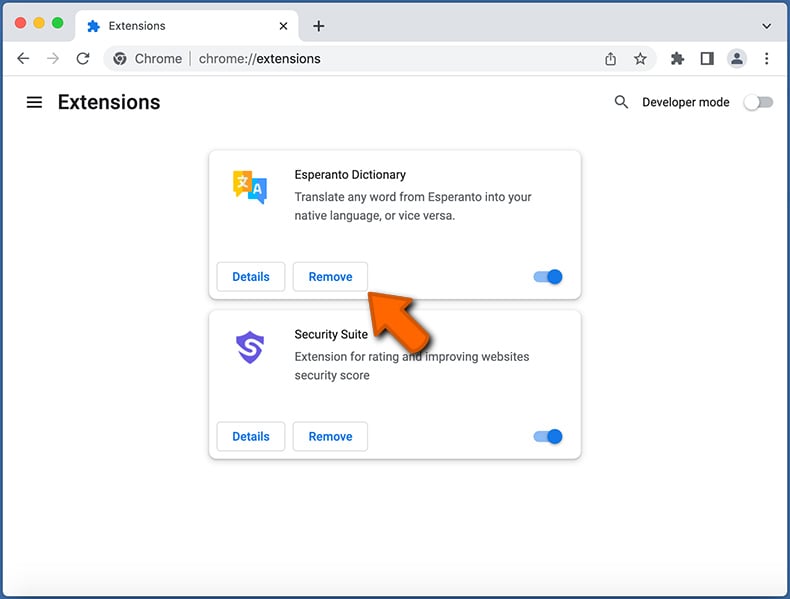
- If you continue to have problems with browser redirects and unwanted advertisements - Reset Google Chrome.
 Remove malicious extensions from Mozilla Firefox:
Remove malicious extensions from Mozilla Firefox:
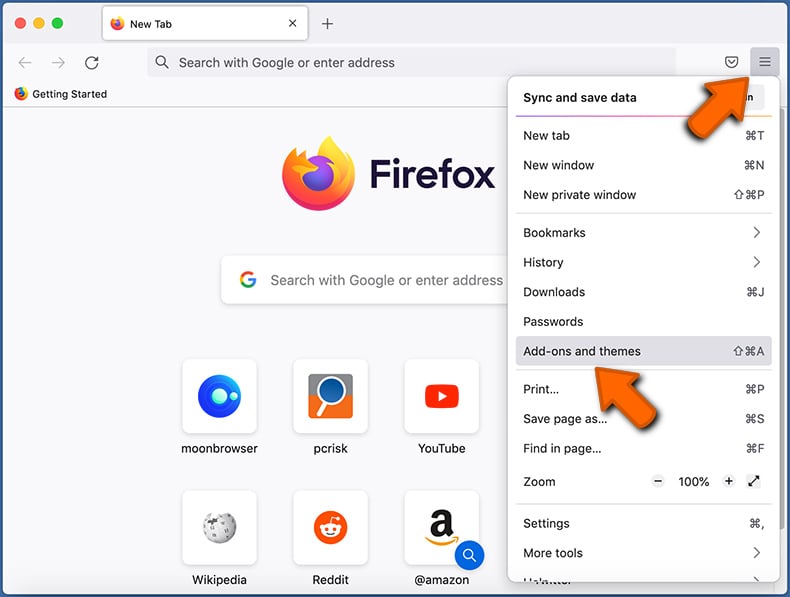
Click the Firefox menu ![]() (at the top right corner of the main window) and select "Add-ons and themes". Click "Extensions", in the opened window locate all recently-installed suspicious extensions, click on the three dots and then click "Remove".
(at the top right corner of the main window) and select "Add-ons and themes". Click "Extensions", in the opened window locate all recently-installed suspicious extensions, click on the three dots and then click "Remove".
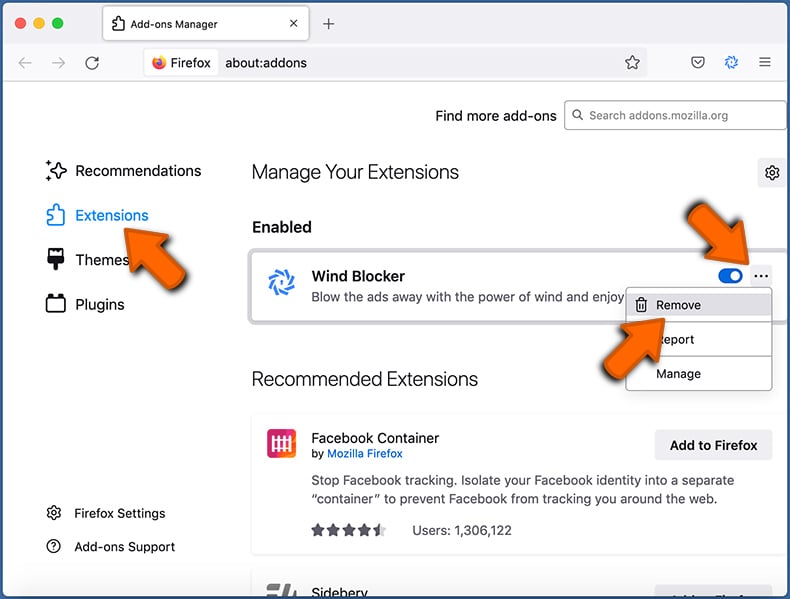
- If you continue to have problems with browser redirects and unwanted advertisements - Reset Mozilla Firefox.
Share:

Tomas Meskauskas
Expert security researcher, professional malware analyst
I am passionate about computer security and technology. I have an experience of over 10 years working in various companies related to computer technical issue solving and Internet security. I have been working as an author and editor for pcrisk.com since 2010. Follow me on Twitter and LinkedIn to stay informed about the latest online security threats.
PCrisk security portal is brought by a company RCS LT.
Joined forces of security researchers help educate computer users about the latest online security threats. More information about the company RCS LT.
Our malware removal guides are free. However, if you want to support us you can send us a donation.
DonatePCrisk security portal is brought by a company RCS LT.
Joined forces of security researchers help educate computer users about the latest online security threats. More information about the company RCS LT.
Our malware removal guides are free. However, if you want to support us you can send us a donation.
Donate
▼ Show Discussion